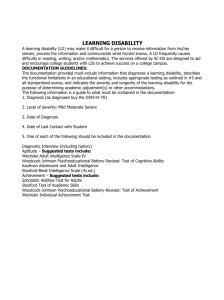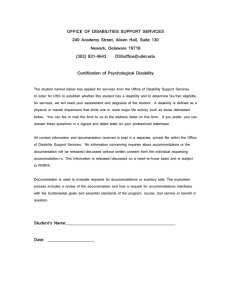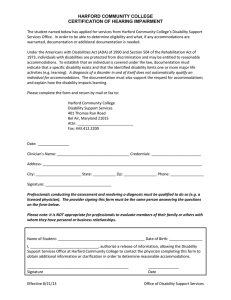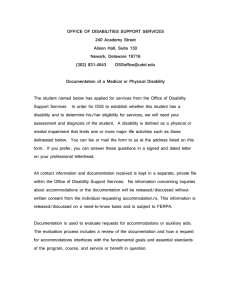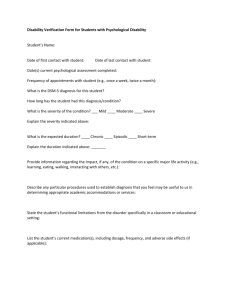HARFORD COMMUNITY COLLEGE CERTIFICATION OF AUTISM SPECTRUM DISORDER
advertisement
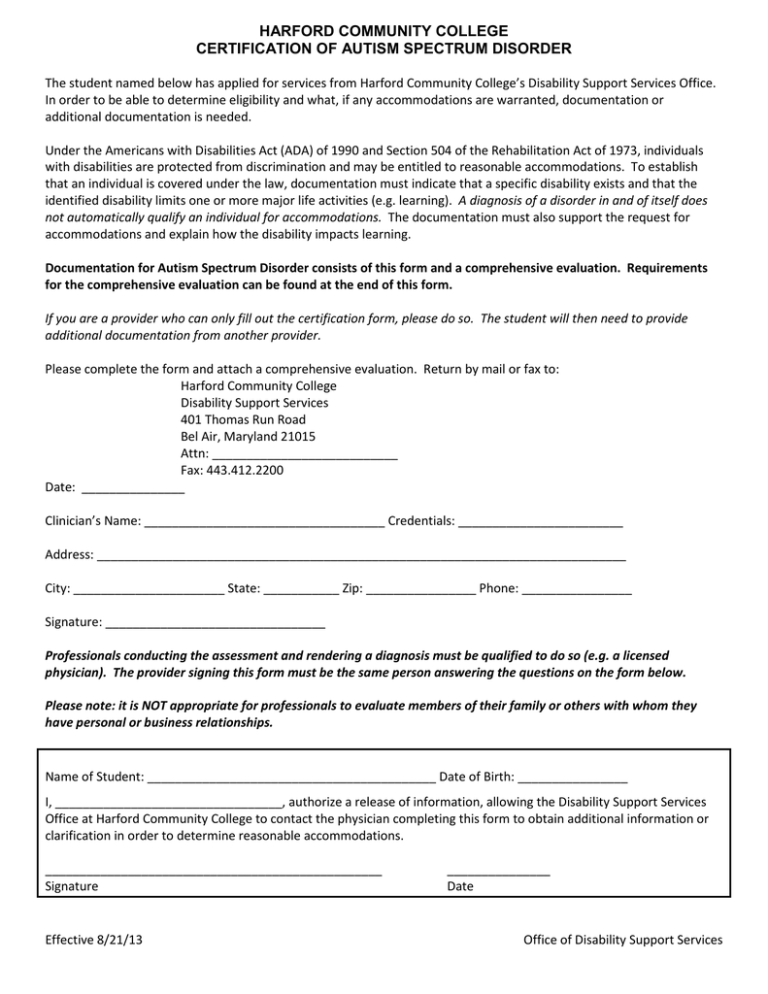
HARFORD COMMUNITY COLLEGE CERTIFICATION OF AUTISM SPECTRUM DISORDER The student named below has applied for services from Harford Community College’s Disability Support Services Office. In order to be able to determine eligibility and what, if any accommodations are warranted, documentation or additional documentation is needed. Under the Americans with Disabilities Act (ADA) of 1990 and Section 504 of the Rehabilitation Act of 1973, individuals with disabilities are protected from discrimination and may be entitled to reasonable accommodations. To establish that an individual is covered under the law, documentation must indicate that a specific disability exists and that the identified disability limits one or more major life activities (e.g. learning). A diagnosis of a disorder in and of itself does not automatically qualify an individual for accommodations. The documentation must also support the request for accommodations and explain how the disability impacts learning. Documentation for Autism Spectrum Disorder consists of this form and a comprehensive evaluation. Requirements for the comprehensive evaluation can be found at the end of this form. If you are a provider who can only fill out the certification form, please do so. The student will then need to provide additional documentation from another provider. Please complete the form and attach a comprehensive evaluation. Return by mail or fax to: Harford Community College Disability Support Services 401 Thomas Run Road Bel Air, Maryland 21015 Attn: ___________________________ Fax: 443.412.2200 Date: _______________ Clinician’s Name: ___________________________________ Credentials: ________________________ Address: _____________________________________________________________________________ City: ______________________ State: ___________ Zip: ________________ Phone: ________________ Signature: ________________________________ Professionals conducting the assessment and rendering a diagnosis must be qualified to do so (e.g. a licensed physician). The provider signing this form must be the same person answering the questions on the form below. Please note: it is NOT appropriate for professionals to evaluate members of their family or others with whom they have personal or business relationships. Name of Student: __________________________________________ Date of Birth: ________________ I, _________________________________, authorize a release of information, allowing the Disability Support Services Office at Harford Community College to contact the physician completing this form to obtain additional information or clarification in order to determine reasonable accommodations. _________________________________________________ Signature Effective 8/21/13 _______________ Date Office of Disability Support Services DIAGNOSIS: Date of Diagnosis: _________________ Date Last Seen: _________________ Axis I: ______________________________________ Axis II: ______________________________________ Axis III: ______________________________________ Axis IV: ______________________________________ Axis V: ______________________________________ GAF: Current ________ Past Year ________ Please list DSM IV Criteria that the student meets: __________________________________________________________________________________________________ __________________________________________________________________________________________________ __________________________________________________________________________________________________ __________________________________________________________________________________________________ __________________________________________________________________________________________________ __________________________________________________________________________________________________ __________________________________________________________________________________________________ In addition to the DSM IV Criteria, how did you arrive at your diagnosis? Please check all relevant items listed below and add brief notes that you feel might be helpful to us as we determine which accommodations and services are appropriate for this student: Structured or unstructured interviews with the student Interviews with other person(s) (Relation to Student: _________________) Behavioral Observations Developmental History Educational History Medical History Standardized or un-standardized rating scales Name of Instrument: ________________________________________________ Name of Instrument: ________________________________________________ Other: ___________________________________________________________________________________________ ___________________________________________________________________________________________ ___________________________________________________________________________________________ Please provide a clinical narrative which describes observations, specific test results, and any information relevant to the disability. _________________________________________________________________________________________ __________________________________________________________________________________________________ __________________________________________________________________________________________________ __________________________________________________________________________________________________ __________________________________________________________________________________________________ __________________________________________________________________________________________________ __________________________________________________________________________________________________ __________________________________________________________________________________________________ __________________________________________________________________________________________________ __________________________________________________________________________________________________ FUNCTIONAL LIMITATIONS: How does the student’s condition currently impact his or her functioning? Functional limitations should be determined WITHOUT consideration of mitigating measures (i.e. medication, etc.). If condition is episodic in nature, level of functioning should be assessed based on active phase symptoms. SEVERITY: Please check. Mild Moderate Severe Does this condition significantly limit one or more of the following major life activities? Communicating Concentrating Hearing Learning Manual Tasks Reading Seeing Thinking Working Other: No Impact Moderate Impact Substantial Impact Unknown Please check the functional limitations or behavioral manifestations for this student: Understanding Nonverbal Behaviors Peer Relationships or Emotional Expression Cognitive Processing Not an Issue Moderate Issue Substantial Issue Unknown Memory Processing Speed Meeting Deadlines Attending Class Organization Reasoning Stress Sleep Appetite Other: Please describe in detail any functional limitations that fall into the substantial range. __________________________________________________________________________________________________ __________________________________________________________________________________________________ __________________________________________________________________________________________________ __________________________________________________________________________________________________ __________________________________________________________________________________________________ MEDICATION CURRENT MEDICATIONS Please provide information of current medications, including dosage and frequency: __________________________________________________________________________________________________ __________________________________________________________________________________________________ __________________________________________________________________________________________________ __________________________________________________________________________________________________ Please explain what symptoms are alleviated by medication and what symptoms still exist: __________________________________________________________________________________________________ __________________________________________________________________________________________________ __________________________________________________________________________________________________ __________________________________________________________________________________________________ Please list side effects from current medication: __________________________________________________________________________________________________ __________________________________________________________________________________________________ __________________________________________________________________________________________________ __________________________________________________________________________________________________ How do these side effects affect the student in an educational setting (e.g. difficulty focusing, difficulty remembering, etc.): __________________________________________________________________________________________________ __________________________________________________________________________________________________ __________________________________________________________________________________________________ __________________________________________________________________________________________________ What medication changes (including dosage changes have there been in the last six months: __________________________________________________________________________________________________ __________________________________________________________________________________________________ __________________________________________________________________________________________________ __________________________________________________________________________________________________ COMPREHENSIVE EVALUATION REQUIREMENTS 1) The evaluation must be performed by a professional who is certified or licensed in the area of adults with learning disabilities (e.g. School Psychologist, Educational Diagnostician or Psychologist). In addition, the report must be reprinted on professional stationary and a signature from the professional must be included at the end of the documentation. 2) A clinical diagnosis is not synonymous with a disability. The documentation must include the student’s specific current functional impairment(s) and describe how the condition substantially limits a major life activity in order for Harford Community College to fully evaluate the necessity for any of the following: academic adjustments, auxiliary aids, and/or auxiliary services. 3) Information from diagnostic interview: history of presenting symptoms, developmental history, family history, psychosocial history, academic history, prior psycho-educational test reports and a history of academic adjustments. 4) Individuals who are 17 years of age or older must be tested with diagnostic instruments normed for adults. The evaluation must include the test scores from at least one test from EACH of the following categories: I. APTITUDE: Assessment of the capacity to learn is needed. • The Wechsler Adult Intelligence Scale-Revised (WAIS-III or WAIS-IV) with subtest scores; or • The Woodcock-Johnson Psycho-Educational Battery Revised: Tests of Cognitive Ability; or • Stanford-Binet Intelligence Scale: Fourth Edition; or • Kaufman Adolescent and Adult Intelligence Test; or • The Differential Ability Scales (DAS); or • The WISC-III or IV may be acceptable if recently administered. II. INFORMATION PROCESSING: Specific areas of information processing (e.g., short and long term memory; sequential memory; auditory and visual perception/processing; processing speed; processing auditory and phonological information, executive functioning, motor ability) must be assessed. • THE WECHSLER ADULT INTELLIGENCE SCALE-Revised (WAIS-III or WAIS IV) with subtest scores; or • THE WOODCOCK-Johnson Psycho-Educational Battery Revised: Tests of Cognitive Ability; or • TEST OF ADOLESCENT LANGUAGE (TOAL); or • DETROIT TESTS OF LEARNING APTITUDE-4 (if recently administered) III. ACHIEVEMENT: Current levels of functioning in reading, mathematics and written language are required. • WOODCOCK-Johnson Psycho-Educational Battery Revised: Tests of Achievement; or • STANFORD TEST OF ACADEMIC SKILLS (TASK) SCHOLASTIC ABILITIES TEST FOR ADULTS; or • WECHSLER INDIVIDUAL ACHIEVEMENT TEST (WIAT); or • SPECIFIC ACHIEVEMENT TESTS SUCH AS THE TEST OF WRITTEN LANGUAGE – 2 (TOWL – 2), Woodcock Reading Mastery Tests-Revised, or the Stanford Diagnostic Mathematics Test. • THE WIDE RANGE ACHIEVEMENT TEST-Revised is not a comprehensive measure of achievement and therefore is not suitable for this category IV. ADAPTIVE BEHAVIOR: If the student is mentally retarded or is suspected to be mentally retarded, then adaptive behavior must be assessed. • VINELAND ADAPTIVE BEHAVIOR (VABS); or • ADAPTIVE BEHAVIOR ASSESSMENT SYSTEM-Second Edition (ABAS-II); or • AAMD ADAPTIVE BEHAVIOR SCALES; OR • Vineland Social Maturity Scale; or • Fairview Developmental Scale; or • Callier-Azusa Scale; or • Alpern Bolls Assessment Scale; or • Other standardized test that assesses the following areas: Communication, Daily Living Skills, Socialization, and Motor Skills The Test Report must include: I. A written narrative of test results. Please state specific cognitive processing strengths, weaknesses, and deficits. Please discuss the following processing areas: a. Visual spatial abilities b. Memory (auditory and visual; short-term and long-term) c. Fine motor/dexterity (speed/sequence of motor patterns) d. Executive functions (verbal and nonverbal reasoning) e. Selective attention/perception (auditory and visual) f. A well-written interpretative summary based on a comprehensive evaluative process is required. II. If oral language skills are assessed please discuss formal instruments or informal analysis of a language sample used. III. Social-emotional assessment is required. Formal assessment instruments and/or clinical interview are appropriate. If applicable, a mental health diagnosis should be clearly stated. IV. Conclusion –includes a brief summary of test results, background history and test observations. The conclusion should clearly explain how the condition causes significant impairment in one or more major life activity. It should also include a detailed explanation of how the disorder limits the student’s functioning in an educational setting for learning or taking tests. V. The recommendation section should include recommendations for accommodations in an educational setting (e.g., extended time because of focusing difficulties, etc.) and indicate the reason these accommodations are warranted if the current treatments are successful. It is helpful if accommodations and strategies are logically related to functional limitations. If connections are not obvious, a clear explanation of their relationship would be helpful.
